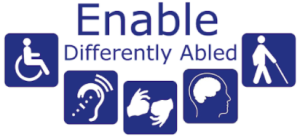
The phrase “differently-abled” means a person who has a disability, either physical or mental. A physical disability might be from birth or later suffered from an accident. A mental disability could be one of the forms of autism. Instead of using derogatory terms such as handicapped and disabled, using differently abled is a polite way of describing a person with the mentioned challenges.
- Differently Abled People are reliable employees with higher job retention rates.
Several studies have shown that the “differently abled” take fewer sick days and are more likely to stay at their jobs longer than other employees.
- Differently Abled employees are less likely to get into work-related accidents.
Two studies, one from the Department of Labor Statistics during the 1990s and a more recent one from the DuPont company, concluded that differently-abled employees had a significantly higher performance in safety than their counterpart employees. Moreover, differently abled employees are more aware and conscientious of workplace safety. Both studies examined labor, operational, managerial, clerical, and service jobs.
- Businesses that hire differently abled may receive tax credits or other incentives.
Eligible businesses can receive tax credits to aid them in hiring and accommodating differently-abled employees. Tax credits help businesses expenses for purchasing equipment for the differently abled employees. Tax credits also help businesses to cover costs for building accessibility. You can read more about the different types of tax credits and eligibility requirements on this page from the IRS.
- Differently Abled employees will increase workplace diversity.
Both workers (differently-abled and non-differently abled) benefit equally from a diverse workplace. By working alongside differently-abled people, employees who are not differently abled will become more aware of how to make the workplace more inclusive and accessible. Employees and customers might consider things they had never thought of before, such as the access challenges faced by the differently abled. Differently abled employees can also teach their coworkers about creativity and other ways to solve problems or accomplish different tasks.
- Differently Abled Employees are as capable as anyone else!
The unemployment rate for differently abled people has constantly hovered at or above 70 percent. This still exists after the Americans with Disabilities Act (ADA) passage. Unfortunately, employers often refuse to hire differently-abled employees because they believe they are incapable of doing the job. Many employers are unaware of the many adaptive techniques and devices available for work. A thorough job description can help employers understand the job’s critical and essential functions. Many differently-abled people already have thought about how to do a job and will find solutions to ensure success.
TAKE A CHANCE! You Will Not Be Disappointed!
Dol.gov.org
https://www.tandfonline.com/doi/abs/10.5172/ser.17.2.207
Top 50 Companies that Hire the Differently Abled People
- Kroger
- Texadelphia
- Howdy Homemade
- Park Cities Ford
- Minyard Sun Fresh
- Home Depot
- H-E-B
- The Kalahari Resort
- The Chocolate Spectrum
- Hugs Cafe
- Publix
- Target
- Acme
- McDonald’s
- Walmart
- Lowes
- Goodwill
- Chick-fil-A
- Sunflower Bakery
- Wegmans
- Furnace Hills Coffee Company
- Delta Sonic Car Wash
- Panera Bread
- Walgreens
- Ikea
- Market Street
- Schnucks
- Stop and Shop
- super Foods
- Lifetime Fitness
- Puzzles Bakery
- The Power Cafe
- Shaws
- Market Basket
- Cameron’s Coffee and Chocolates
- Fazoli’s
- Howdy Homemade
- John’s Crazy Socks
- Walgreens
- Market Street
- Stop and Shop
- CiCi’s Pizza
- SuperLo Foods
- Lifetime Fitness
- Bitty & Beau’s Coffee
- Best Buy
- Proctor and Gamble
- PepsiCo
- Autozone
- UPS
